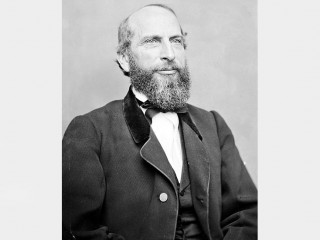
Speed James biography
Date of birth : 1812-03-11
Date of death : 1887-06-25
Birthplace : Kentucky, United States, Jefferson County
Nationality : American
Category : Politics
Last modified : 2010-06-04
Credited as : Lawyer and politician, Attorney General, Jane Cochran
0 votes so far
Education and Early Work
James Speed, the son of John and Lucy Fry Speed, came from a prominent Kentucky family. He grew up five miles from the capital in Louisville and attended a local school. At just 16 years old, he graduated from St. Joseph's College in Bardstown, Kentucky. Prior to studying law at Transylvania University, he worked briefly as a clerk; in 1833, at age 21, he began his legal practice in Louisville.
Career
Kentucky was a slave state in the 1830s and 1840s, and Speed was in favor of emancipating the slaves. He ran for and won a seat on the state legislature in 1841, but eight years later lost out to a pro-slavery candidate. Interestingly, his grandfather had suffered a similar defeat over the same issue in 1792. In spite of this, Speed did not alter his stance to win popularity; instead, in the same year as his defeat (1849), he wrote a series of stridently anti-slavery letters to the Louisville Courier newspaper. During the next decade, Speed continued his law practice, and from 1856 to 1858 taught law at the University of Louisville.
As the Civil War approached, Speed became a leader in Kentucky's pro-Union movement. His family's old friend, Abraham Lincoln, had now become president of the United States, and Lincoln asked Speed's help in organizing Kentucky volunteers for the Union army. In 1861 Speed was elected to the state senate and held that position until July 1863. On December 2, 1864, President Lincoln appointed him attorney general of the United States. Lincoln would characterize Speed as "an honest man and a gentleman, and one of those well-poised men, not too common here [in Washington], who are not spoiled by a big office."
After Lincoln's death, Speed drifted from the moderation that had characterized both Lincoln's and his view of the Confederacy to something more like the "Radical Republican" stance that prevailed during the years of the Reconstruction. In this he found himself at odds with President Andrew Johnson, who resisted the harsh measures many of the Radical Republicans wanted to impose on the now-defeated Confederate states in the Reconstruction. Taking issue with Johnson specifically over issues concerning the voting rights of slaves and the rights of states against the federal government, Speed resigned from the Cabinet on July 17, 1866.
After leaving Washington and returning to his law practice in Louisville, Speed became more involved in the Radical Republican movement, serving as chairman of the 1866 Southern Radical convention in Philadelphia. He had few kind words to say about Johnson, who he described as the "tyrant of the White House." In 1867, he was almost elected U.S. senator, and in 1868, the Kentucky delegation to the Republican convention voted for him as Vice President of the United States. He ran for the House in 1870, but lost, and in 1872 and 1876 served as a delegate to his party's conventions. By the late 1870s, Reconstruction was coming to a close and with it the Radical Republican movement; Speed, too, returned to a more moderate politics. From 1872 to 1879, he again taught law at the University of Louisville. He died in 1887 at his Louisville Home, "The Poplars," and was buried at Louisville's Cave Hill Cemetery.
In the late 1850s and early 1860s, as civil war became more and more inevitable, controversy grew in "border states" such as Missouri, Maryland, and Speed's own Kentucky. These states were not solidly Unionist in the same way as Massachusetts, for instance, because plenty of their citizens still owned slaves and had ties to the South. They were also, however, not solidly Confederate in the same way as South Carolina, because their economies were not entirely based on agriculture and its need for cheap labor to work the land. Speed proved a great moderating force in Kentucky and had a significant influence on the state's decision to remain within the Union. Later, as attorney general under Lincoln, he helped support the concepts of a federalized government and equal rights for all citizens embodied in the Thirteenth, Fourteenth, and Fifteenth amendments.
Personal Life
In 1841, Speed married Jane Cochran, and the couple had seven sons.
Family: In 1841, Speed married Jane Cochran, and the couple had seven sons. Education: At just 16 years old, he graduated from St. Joseph's College in Bardstown, Kentucky. He studied law at Transylvania University.
















